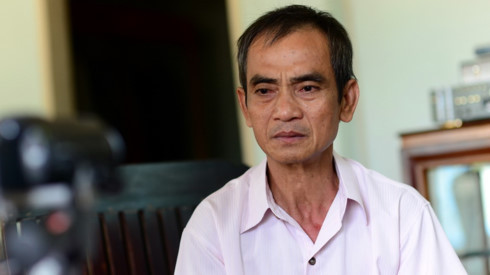Removing bottlenecks in compensation for wrongful convictions
The draft Law on State Compensation Liability (amended) is attracting public attention, especially when compensation for wrongful convictions remains a hot topic.
Reporter interviewed lawyer Tran Huu Huynh - Chairman of Vietnam International Arbitration Center about the Draft Law on State Compensation Liability (amended).
 |
| Tran Huu Huynh - Chairman of Vietnam International Arbitration Center talks with VOV reporter. |
PVFrom the practice of handling wrongful compensation by the authorities, how do you perceive this issue?
Lawyer Tran Huu Huynh: The practice of compensation for wrongful convictions has made certain progress. There were 258 wrongful convictions, of which we have resolved more than 200. Attention to preventing wrongful convictions in criminal proceedings has become one of the regular activities.
The practice of compensation for wrongful convictions has initially created trust, with cases that have just been resolved such as Mr. Luong Ngoc Phi in Thai Binh being compensated 23 billion VND, Mr. Huynh Van Nen being compensated more than 10 billion VND or Mr. Nguyen Thanh Chan being compensated 7.2 billion VND. These figures, if compared with their losses, may not accurately reflect the problem, but compared to before, the attitude and responsibility of the agencies have been better.
However, looking at the current situation, there are still some concerns and this is also one of the bases for us to amend the Law on State Compensation Liability. Firstly, there are too many agencies handling compensation, leading to shifting and avoiding responsibility, resulting in the rights of the wrongfully convicted not being protected in a timely manner, or even not being protected at all; the amount of damage has not been specified, making the agencies conducting compensation confused in their application.
Second, the compensation for wrongful convictions is still unprofessional; the amount of each compensation has not been quantified, which is also a factor that makes the compensation process take longer and the negotiations are also difficult. The procedures are not complete, strict, and cumbersome, and the time limit is too long. For example, Mr. Luong Ngoc Phi had to spend 18 years to get his money back; Mr. Nen had to negotiate 7 times; Mr. Nguyen Thanh Chan had to change his records 4 times and about 100 types of documents.
The result of that negotiation may not necessarily reflect that they actually agree to that amount, but because the process is so complicated and takes so long, sometimes they have to accept it.
 |
| After more than 17 years of wrongful imprisonment, Mr. Huynh Van Nen was compensated more than 10 billion VND. Photo: Tuoi Tre |
PV: When discussing the Draft Law, one of the important issues that is receiving many different opinions is the basis for determining the responsibility for compensation, including proving actual damages. Sir, the injustice is caused by the person performing official duties, why do you make it difficult for the person who is wrongly accused?
Lawyer Tran Huu Huynh:The approach of the 2009 Law on State Liability Compensation and the approach of this Draft Law also consider compensation for such damage as a form of compensation for damages outside the contract. In principle, if it is compensation for damages outside the contract, there must be the following grounds: the act causing the damage must be illegal and to confirm that the act is illegal, there must be a document from a competent authority; there must be damage; there must be a causal relationship between the illegal act of the person performing official duties and the damage suffered by the wronged person.
To obtain a document from a competent authority concluding that the act is illegal and causes damage is not simple at all. Because it often involves many agencies, the sincere attitude of some civil servants and public servants. Therefore, to obtain such a document requires the injured person or their legal assistant to be very persistent.
The second difficulty is to prove that there is damage, but this is not easy. In our current approach, the injured person must always satisfy the compensation settlement agency, when I agree, you will accept that compensation amount.
We want to approach it in a different way, where the injured person has already made every effort to prove it, and if you want to refute that opinion, you have to prove the opposite. That is an approach that the Law has not done for a long time.
PV:The losses suffered by the wrongfully accused are incalculable. But when they are exonerated, the wait for compensation is equally arduous. In your opinion, what changes should be made to the regulations on compensation procedures?
Lawyer Tran Huu Huynh: To solve this problem, first of all, we need to approach it from the side of law making. Wrongful convictions are caused by public servants, so they must be held responsible..On the government's side, those people represent it to perform public duties. If those people are wrong, then the government is also wrong and needs to have a very transparent attitude in protecting the rights of the wronged.
To do that, the procedures should not be so complicated and the agencies that carry out compensation for wrongful convictions should be streamlined, making it easier for those who have been wrongly convicted to exercise their rights. We hope that there will be a specialized agency for compensation for wrongful convictions to resolve the issue in the quickest and most concise way.
The settlement time is not 30-40 days as before, but can be reduced to 2, 3 or 5 days. Compensation must be comprehensive and thorough. In cases where there are no invoices or documents, it is necessary to be transparent and clear so that the wronged person knows that if they lose the invoices or documents or cannot remember or cannot get them back, there must be a clear number, that is, quantified so that they know in advance the amount of compensation. Regarding the issue of public apology, it must also be done respectfully.
PV: Up to this point, the total amount of compensation that the State has had to pay since the implementation of the Law on State Compensation Liability is more than 111 billion VND. Public opinion has raised the issue that the money paid by the people in taxes is not for compensation, but for the person performing public duties who caused the damage. In your opinion, how should this be regulated to be reasonable?
Lawyer Tran Huu Huynh: Paying taxes is to serve the public health, education, transportation… of the country. If paying taxes is only to compensate for wrongful convictions, it will be very difficult for the State to develop.
When approaching the Draft Law, we see that it is divided into two types. One is that the person performing public duties intentionally commits a wrongdoing and is convicted of a crime, then he must compensate for all the damage caused by the State. Second, intentionally commits a wrongdoing but not to the extent of criminal prosecution, according to the Draft Law, it is 30-50 months' salary, less than 50% of the amount of compensation paid by the State. The type of unintentional damage is 3-5 months' salary and there are also some cases of exemption due to circumstances.
PV:Thank you, sir./.
According to VOV
